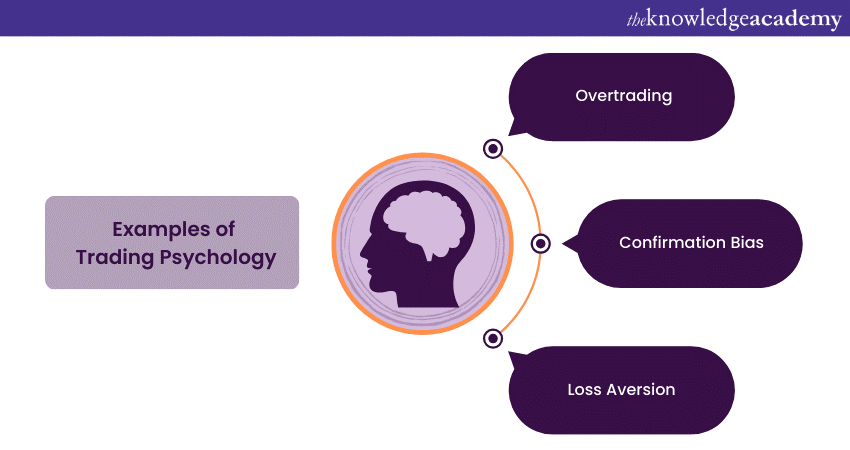We may not have the course you’re looking for. If you enquire or give us a call on 01344203999 and speak to our training experts, we may still be able to help with your training requirements.
Training Outcomes Within Your Budget!
We ensure quality, budget-alignment, and timely delivery by our expert instructors.

Trading is not only about charts and numbers; it's also about understanding the human mind. According to experts, successful trading is a result of 30% strategy and 70% of understanding Trading Psychology. So, if you are capable of handling your emotions and making full use of Trading, progress is not far for you in the Trading world. But What is Trading Psychology exactly? It refers to the emotional and mental factors that influence a Trader's decision-making abilities and behaviour in the financial markets.
So, if Trading Psychology interests you too, read this blog further. In this blog, discover What is Trading Psychology coupled with some examples, and learn how emotions impact trading decisions and strategies.
Table of content
1) Understanding What is Trading Psychology?
2) Why does Trading Psychology matter?
3) Examples of Trading Psychology
a) Overtrading
b) Confirmation bias
c) Loss aversion
4) How to deal with emotions in Trading?
5) Conclusion
Understanding What is Trading Psychology?
Trading Psychology is the study of how emotions and mental states affect the decision-making and behaviour of Traders in the financial markets. It is based on the scientific discipline of psychology, which examines the mind and behaviour of humans and other animals. Trading Psychology covers various aspects of a Trader’s personality and mindset, such as their thoughts, feelings, beliefs, and biases, which can have a significant impact on their Trading performance and success.
Traders face many emotional challenges and pressures while Trading, such as fear, greed, confidence, discipline, risk-taking, hope, and regret. These emotions can influence how Traders perceive and react to market information, and how they execute their Trading strategies and plans. Trading Psychology helps Traders understand and manage their emotions, and develop a rational and objective approach to Trading. It also helps Traders avoid common psychological pitfalls and biases, such as overconfidence, confirmation bias, loss aversion, and anchoring.
One example of how Trading Psychology can affect Trading behaviour is the case of loyalty bias. This is when a Trader has a strong attachment or preference for a certain company or stock, and refuses to sell it even when its price is falling, because they trust or admire it. This can lead to unnecessary losses and missed opportunities, as the Trader ignores the data and the market signals. Trading Psychology can help Traders overcome this bias by encouraging them to be critical and realistic, and to diversify their portfolio.
Trading Psychology is an essential skill for every Trader, as it can improve their Trading performance and profitability. By learning and applying the principles and techniques of Trading Psychology, Traders can enhance their knowledge, experience, and skill, and become more successful and confident in the financial markets.
Why does Trading Psychology matter?
Trading Psychology is important because it influences how Traders make investment decisions and manage their portfolios. Traders can use different types of analysis to evaluate the financial markets, such as fundamental analysis, which uses data from financial reports and economic indicators, or technical analysis, which uses data from past market movements and trends. However, no matter what type of analysis they use, Traders are prone to psychological biases, which are subjective and irrational ways of thinking and processing information. These can lead to mistakes and poor decisions, which can affect their Trading performance and profitability.
Want to uncover the secrets of successful Stock Trading? Join our Stock Trading Masterclass now!
Examples of Trading Psychology
Here are three examples of Trading Psychology that will explain Trading Psychology in more detail:

Overtrading
This occurs when a Trader makes an excessive Trade within a short period. It is often driven by Fear of Missing Out (FOMO) or the desire to recover losses as soon as possible. Overtrading can lead to poor decision-making, increased transaction costs, and emotional exhaustion, as Traders may not have time to analyse each Trade thoroughly. To prevent overtrading, Traders need to follow these steps:
1) Set clear rules: Define specific criteria for entering and existing Trade. Stick to these rules to avoid impulsive decisions.
2) Use a Trading plan: Create a well-thought-out Trading plan that aligns with your goals, risk tolerance, and strategies.
3) Limit trade frequency: Set a maximum number of Trades per day or week to prevent overtrading.
Confirmation bias
Traders with confirmation bias tend to seek out information that supports their existing beliefs or Trading strategies while ignoring contradictory information. This can lead to uneven perception of the market, as Traders become overly confident in their decisions and miss out on potential risks. There are some steps to follow to avoid confirmation bias.
1) Seek diverse information: As a Trader, you need to actively seek out different viewpoints to avoid becoming too entrenched in a single perspective.
2) Record Trades and analysis: Keep a Trading journal that records your Trades and the reasons behind them.
3) Encourage suspiciousness: Start challenging your own beliefs and assumptions regularly.
Loss aversion
Loss aversion is the inclination of Traders to experience a stronger emotional reaction to losses, which outweighs the satisfaction derived from gains. This psychological bias can lead Traders to hold on to losing positions longer than they should, hoping the market will turn in their favour and potentially missing out on other profitable opportunities. It can lead to impulsive decisions and avoid realising losses, which may result in further losses. Here are the following steps to prevent loss aversion:
1) Focus on risk management: Allocate a specific percentage of your Trading capital to each Trade. This prevents you from risking too much on a single Trade and reduces the emotional impact of loss.
2) Practice mindfulness: Be aware of your emotional reactions to losses. Take breaks, practice relaxation techniques, and maintain a long-term perspective to mitigate the pain of losses.
Register now and embark on your journey towards confident and informed trading with our Investment and trading Training.
How to deal with emotions in Trading?
We experience so many emotions at a time, and some common emotions can really affect how we Trade:
Fear
When it comes to Stock Trading, the very first emotion that comes is “Fear”. It is a very common and natural reaction that comes in the form of a threat. When we indulge in Trading, we expect the market situation to move according to our anticipated direction. Fear starts coming gradually when the situation turns exactly opposite of what we anticipated. Now, this fear can lead to making impulsive decisions without even thinking about potential risks. To deal with fear, we can follow certain steps.
1) Set stop-loss orders to limit potential losses and ensure you are comfortable with the amount you are risking in each trade.
2) Research and analyse the market thoroughly to gain confidence in your Trades.
3) Practice techniques like deep breathing and meditation to stay calm and focused.
Greed
Greed is also a most common emotion when it comes to Trading. It refers to an excessive desire for profit that can lead Traders to make irrational and risky decisions. Greed often manifests as an insatiable longing for larger gains, sometimes at the expense of following a well-thought-out trading strategy. Here are some steps to deal with greed in Trading:
1) Develop a Trading plan that adds entry and exit criteria. Stick to the plan to avoid chasing excessive gain.
2) Define your profit targets and take partial or full profits when these targets are reached. Avoid getting greedy or waiting for unrealistic gains.
Hope
In Trading, hope refers to an emotional state where a Trader holds onto a losing position with the optimistic expectations that the market will eventually move in their favour. This emotional attachment to a losing Trade can lead to impulsive decisions and potential risks. Here are some ways to deal with “hope” in Trading:
1) Set stop-loss levels based on your Trading plan. This prevents you from holding onto losing position in so many hopes.
2) Understand that losses are a common part of Trading. Accepting the fact and moving will help you avoid making emotional decisions.
Conclusion
We hope that you read and understood What is Trading Psychology through our blog . Always keep this thing very clear in mind: Stock Trading is volatile. So, it is imperative to balance several emotions while Trading to make informed decisions and avoid potential risks.
Do you want to elevate your investment game? Enrol in our Investment Management Masterclass!
Frequently Asked Questions

Mindset is the way you think and feel about Trading, and it can have a significant impact on your Trading outcomes. A positive mindset can help you cope with market volatility, manage risk, and make rational decisions. A negative mindset can lead to emotional trading, poor discipline, and suboptimal performance.

To develop strong Trading Psychology skills, you need to be aware of your emotions, biases, and behaviors, and how they affect your Trading. You also need to have a clear and realistic Trading plan, and follow it with discipline and consistency. Additionally, you need to practice emotional control, risk management, and self-improvement techniques, such as journaling, meditation, and seeking feedback.

Understanding Trading Psychology can benefit your career in finance by enhancing your Trading performance and profitability. It can also help you avoid common psychological pitfalls and errors that can harm your reputation and credibility. Furthermore, it can help you develop a competitive edge, a resilient mindset, and a professional attitude in the financial markets.

The Knowledge Academy takes global learning to new heights, offering over 30,000 online courses across 490+ locations in 220 countries. This expansive reach ensures accessibility and convenience for learners worldwide.
Alongside our diverse Online Course Catalogue, encompassing 17 major categories, we go the extra mile by providing a plethora of free educational Online Resources like News updates, Blogs, videos, webinars, and interview questions. Tailoring learning experiences further, professionals can maximise value with customisable Course Bundles of TKA.

The Knowledge Academy’s Knowledge Pass, a prepaid voucher, adds another layer of flexibility, allowing course bookings over a 12-month period. Join us on a journey where education knows no bounds.

The Knowledge Academy offers various Investment and Trading Training, including Stock Trading, Real Estate and Investment Banking courses. These courses cater to different skill levels, providing comprehensive insights into Investment and Trading methodologies.
Whether you are starting your journey or aiming to elevate your Investment and Trading expertise, immerse yourself in our Business Skills blogs to discover more insights!







 Top Rated Course
Top Rated Course




 If you wish to make any changes to your course, please
If you wish to make any changes to your course, please


